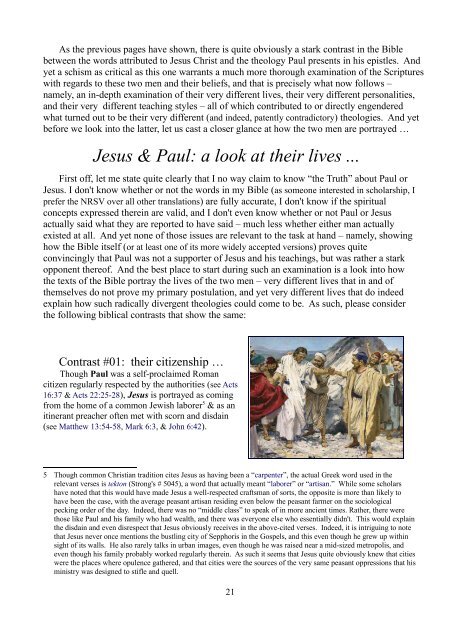The Cult of Paul
an exhaustive biblical examination of the starkly contrasting lives, values, & theologies of Jesus Christ and Paul -- Jesus' most zealous “apostle,” and the true father of the modern-day Christian church
an exhaustive biblical examination of the starkly contrasting lives, values, & theologies of Jesus Christ and Paul -- Jesus' most zealous “apostle,” and the true father of the modern-day Christian church
You also want an ePaper? Increase the reach of your titles
YUMPU automatically turns print PDFs into web optimized ePapers that Google loves.
As the previous pages have shown, there is quite obviously a stark contrast in the Bible<br />
between the words attributed to Jesus Christ and the theology <strong>Paul</strong> presents in his epistles. And<br />
yet a schism as critical as this one warrants a much more thorough examination <strong>of</strong> the Scriptures<br />
with regards to these two men and their beliefs, and that is precisely what now follows –<br />
namely, an in-depth examination <strong>of</strong> their very different lives, their very different personalities,<br />
and their very different teaching styles – all <strong>of</strong> which contributed to or directly engendered<br />
what turned out to be their very different (and indeed, patently contradictory) theologies. And yet<br />
before we look into the latter, let us cast a closer glance at how the two men are portrayed …<br />
Jesus & <strong>Paul</strong>: a look at their lives ...<br />
First <strong>of</strong>f, let me state quite clearly that I no way claim to know “the Truth” about <strong>Paul</strong> or<br />
Jesus. I don't know whether or not the words in my Bible (as someone interested in scholarship, I<br />
prefer the NRSV over all other translations) are fully accurate, I don't know if the spiritual<br />
concepts expressed therein are valid, and I don't even know whether or not <strong>Paul</strong> or Jesus<br />
actually said what they are reported to have said – much less whether either man actually<br />
existed at all. And yet none <strong>of</strong> those issues are relevant to the task at hand – namely, showing<br />
how the Bible itself (or at least one <strong>of</strong> its more widely accepted versions) proves quite<br />
convincingly that <strong>Paul</strong> was not a supporter <strong>of</strong> Jesus and his teachings, but was rather a stark<br />
opponent there<strong>of</strong>. And the best place to start during such an examination is a look into how<br />
the texts <strong>of</strong> the Bible portray the lives <strong>of</strong> the two men – very different lives that in and <strong>of</strong><br />
themselves do not prove my primary postulation, and yet very different lives that do indeed<br />
explain how such radically divergent theologies could come to be. As such, please consider<br />
the following biblical contrasts that show the same:<br />
Contrast #01: their citizenship …<br />
Though <strong>Paul</strong> was a self-proclaimed Roman<br />
citizen regularly respected by the authorities (see Acts<br />
16:37 & Acts 22:25-28), Jesus is portrayed as coming<br />
from the home <strong>of</strong> a common Jewish laborer 5 & as an<br />
itinerant preacher <strong>of</strong>ten met with scorn and disdain<br />
(see Matthew 13:54-58, Mark 6:3, & John 6:42).<br />
5 Though common Christian tradition cites Jesus as having been a “carpenter”, the actual Greek word used in the<br />
relevant verses is tekton (Strong's # 5045), a word that actually meant “laborer” or “artisan.” While some scholars<br />
have noted that this would have made Jesus a well-respected craftsman <strong>of</strong> sorts, the opposite is more than likely to<br />
have been the case, with the average peasant artisan residing even below the peasant farmer on the sociological<br />
pecking order <strong>of</strong> the day. Indeed, there was no “middle class” to speak <strong>of</strong> in more ancient times. Rather, there were<br />
those like <strong>Paul</strong> and his family who had wealth, and there was everyone else who essentially didn't. This would explain<br />
the disdain and even disrespect that Jesus obviously receives in the above-cited verses. Indeed, it is intriguing to note<br />
that Jesus never once mentions the bustling city <strong>of</strong> Sepphoris in the Gospels, and this even though he grew up within<br />
sight <strong>of</strong> its walls. He also rarely talks in urban images, even though he was raised near a mid-sized metropolis, and<br />
even though his family probably worked regularly therein. As such it seems that Jesus quite obviously knew that cities<br />
were the places where opulence gathered, and that cities were the sources <strong>of</strong> the very same peasant oppressions that his<br />
ministry was designed to stifle and quell.<br />
21

















